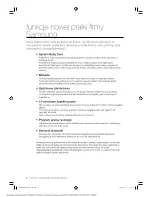
Cleaning and Maintenance
The mill is maintenance-free when used properly. It cleans itself through grinding operation. Should
damp cereals clog the works, please empty the mill. Then coarsely mill about 100 g of wheat. If this does
not show any success, please remove the movable roller. You will then be able to clean both rollers with
a dry and hard brush. Never use neither water nor cleaning agents
If you will not be able to re-adjust the handle into the 0- position, please follow the instructions below:
Completely turn the knob to the left. Remove the knob by pulling it forward with a strong jerk. Replace
the knob carefully. Lift the scale disc from the milling cone about 5 mm and make the zero point of the
scale coincide with the pointer of the setting button. Replace the scale disc and the knob to the milling
cone in that position.
Information and tips on grains
Warranty
Schnitzer grain mills are robust and reliable. The millstones are self-sharpening. As a rule they are distin-
guished by a service life lasting decades.
Should nevertheless some fault arise which cannot be rectified, please contact us via phone. Most of the
time, minor problems can be solved on the phone by our technical personnel.
We offer a warrenty of two years from the purchase date. Within the warranty period we will remedy
free of charge all faults due to material defects or manufacturing defects, by repair or by replacement of
parts or replacement of the mill as a whole at our choice.
Grains have to be stored in a dry, airy and cool place. The best place of storage is a cool and dry room.
Ideally, grains should be stored in wooden boxes or special grain bags. These are not sealed air-tight.
Grains are hygroscopic, i. e. they absorb moisture from the air. If the grains to mill are too wet, rollers
might smear.
The so called “knife-test” can be used before milling in order to test if the grains are dry enough. Place
a grain on a flat, hard board and crush it with the back of a knife. Dry grains will burst with a noisy crack.
Grains that are too wet will be mashed into flakes. Therefore, fatty grain like oats should never be milled
too finely.
If your grain is too wet, fill it into a little basked and put it at a warm place to dry. Please be aware that
the temperature should not surpass 35 °C (95 °F).


























